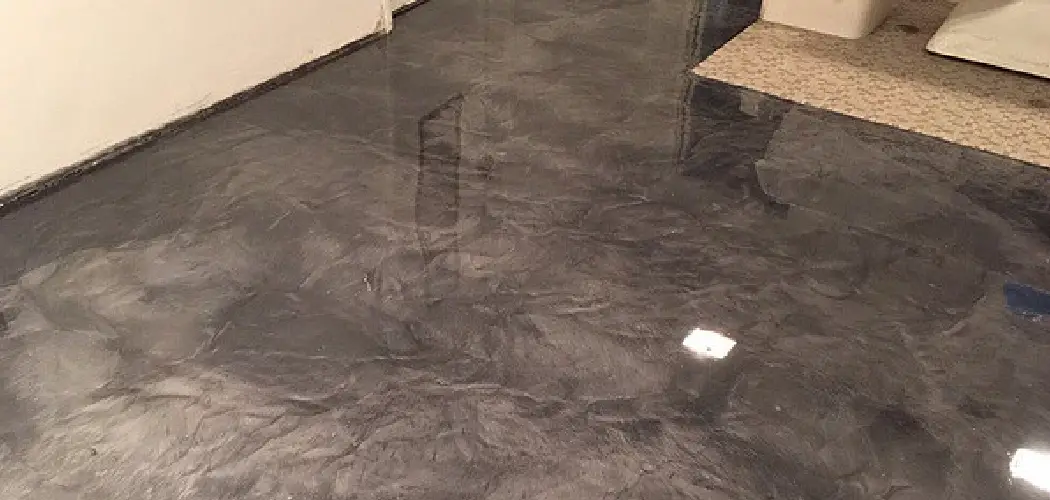You may have a question should I epoxy my basement floor? You’re not alone. An epoxy is a popular option for basement floors because it’s durable and easy to clean.
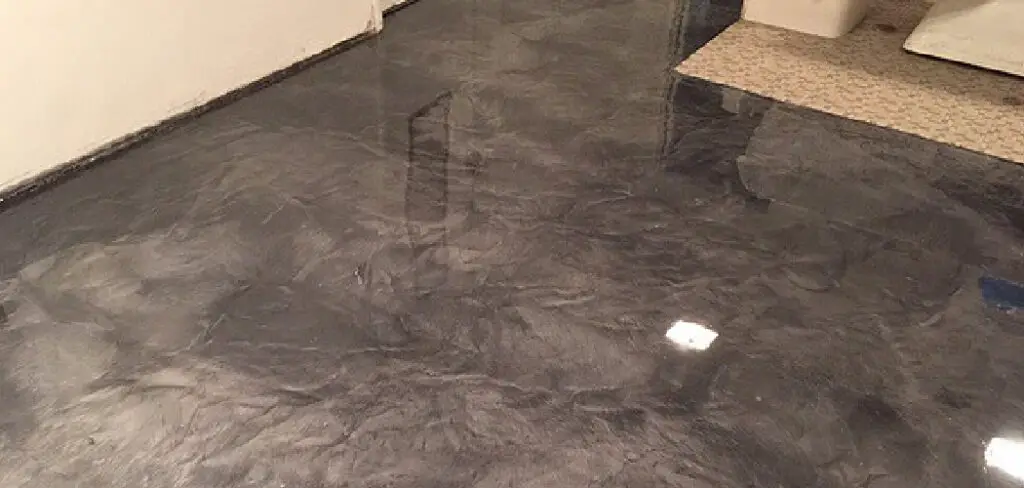
However, there are some things you should keep in mind before making a decision. In this blog post, we’ll explore the pros and cons of epoxy basement floors so you can make an informed decision about what’s right for your home.
Can You Epoxy Your Basement Floor?
Most people don’t think about their basement floors very often. However, if you have a damp or uneven basement floor, it can be a source of frustration.
Not only is it unsightly, but it can also make your basement feel cold and damp. One way to improve the appearance and function of your basement floor is to epoxy it.
Epoxy is a durable resin that can be used to create a smooth, level surface. It is also resistant to mold and mildew, making it an ideal choice for wet or humid basements.
In addition, epoxy is easy to clean and maintain, and it can even help to insulate your basement against cold temperatures. So if you’re looking for a way to improve your basement floor, epoxy may be the perfect solution.
Why Should You Epoxy Your Basement Floor?
Epoxy is a polymeric material that can be used to create a waterproof barrier. When applied to concrete, epoxy creates a durable and long-lasting surface that is resistant to staining and easy to clean. In addition, epoxy is available in various colors and can be used to create decorative patterns on your basement floor.
Applying an epoxy coating to your basement floor can also help to hide any cracks or imperfections in the concrete. As a result, epoxy is an ideal material for finishing basement floors. In addition to its aesthetic benefits, epoxy also provides excellent protection against moisture and mold.
By sealing your basement floor with epoxy, you can create a healthy and comfortable environment for your family.
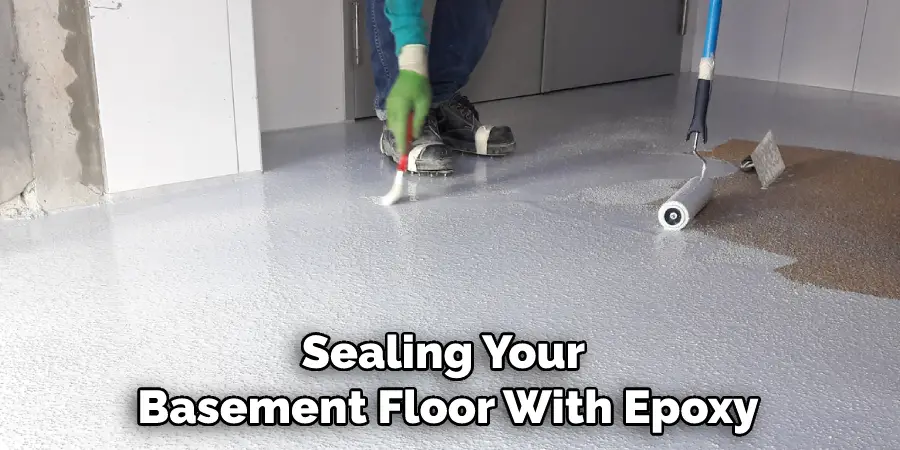
Should I Epoxy My Basement Floor?
Epoxy flooring is a type of floor coating that is applied in a two-part system. The first is a resin, and the second is a hardener. When these two parts are mixed together, they create a tough, durable surface that can resist high temperatures, chemicals, and impacts.
Epoxy flooring is often used in commercial and industrial settings but can also be used in residential basements. Basements are typically damp and humid, which can cause problems with traditional flooring materials like carpet or wood. Epoxy flooring is resistant to moisture and mold, making it an ideal choice for basement floors.
In addition, epoxy flooring is easy to clean and maintain and can be installed quickly and easily. So if you’re looking for a durable, low-maintenance flooring option for your basement, epoxy flooring may be the right choice for you.
Pros of Epoxy Basement Floors
1. Durability
One of the biggest advantages of epoxy basement floors is their durability. Epoxy is a tough material that can withstand a lot of wear and tear. This makes it ideal for high-traffic areas like basements.
2. Easy to Clean
Another advantage of epoxy basement floors is that they’re easy to clean. Since the surface is nonporous, spills and dirt can be easily wiped up. This is a major benefit if you have kids or pets who often track in mud and other messes.
3. Aesthetically Pleasing
Epoxy basement floors also have a tendency to be more aesthetically pleasing than other options like concrete or tiles. This is because epoxy comes in various colors and can even be given a marble or granite finish.
4. Increased Value
Finally, choosing epoxy for your basement floor can also increase the value of your home. This is because potential buyers will see the epoxy floor as an upgrade that doesn’t need to be made immediately.
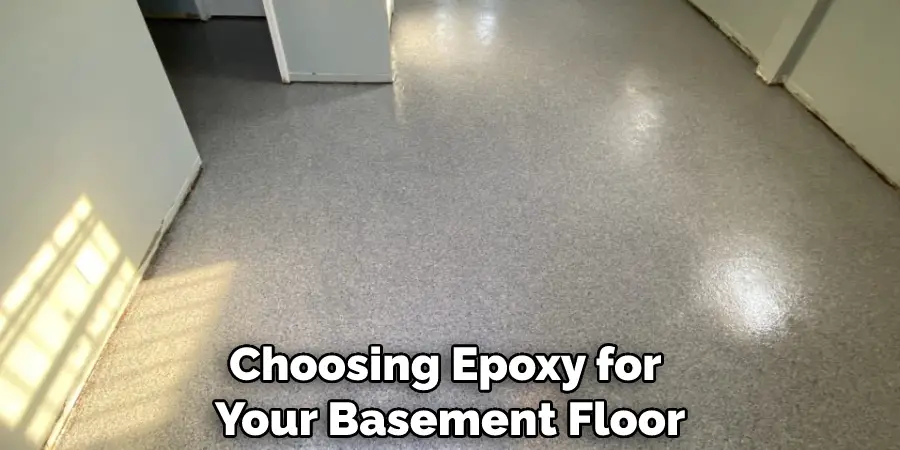
Cons of Epoxy Basement Floors
1. Cost
One downside of epoxy basement floors is that they can be more expensive than other options like concrete or tiles. This is because epoxy is typically applied by a professional, and the materials can be costly.
2. Not Diy Friendly
Another downside to epoxy basement floors is that they’re not as DIY-friendly as other options, like painting concrete floors. This is because applying epoxy requires special equipment and training. As a result, it’s best to leave this job to the professionals.
3. Limited Color Choices
While there are more color choices available now than there were in the past, there are still limited compared to other flooring options like carpeting or hardwood floors. So if you have your heart set on a specific color scheme, epoxy might not be your best option.
4. Requires Regular Maintenance
Finally, one thing to remember about epoxy basement floors is that they require regular maintenance. This includes sweeping and mopping regularly to prevent dirt and spills from damaging the surface. Additionally, you’ll need to reapply the epoxy every few years to keep it looking its best.
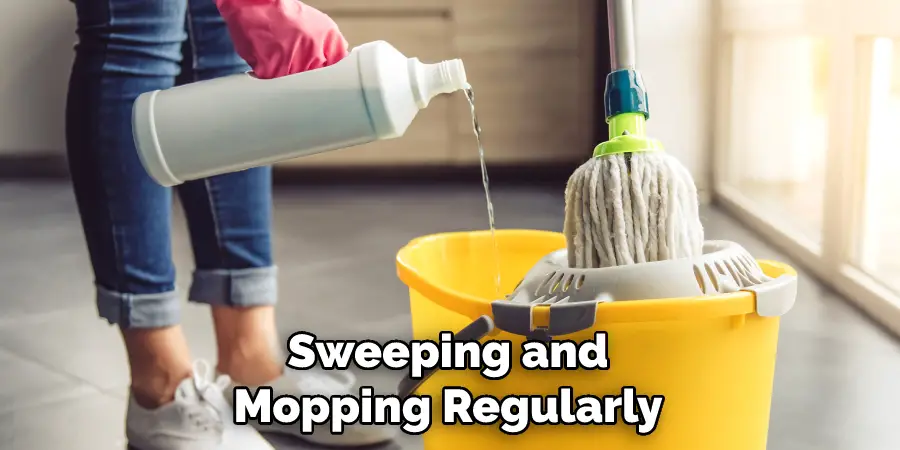
What Factors to Consider when Epoxying a Basement Floor?
There are many factors that need to be considered when epoxying a basement floor. The first is the condition of the floor. If there are cracks or other damage, they need to be repaired before epoxy can be applied. The second is the temperature. Basements can be very cold, and the epoxy will not cure properly if the temperature is below 50 degrees Fahrenheit.
The third factor is humidity. Again, basements can be very humid, and the epoxy will not cure properly if the relative humidity is above 80%. Finally, the fourth factor is the length of time that the floor will be used. If the floor is only used for occasional storage, then a lower-quality epoxy can be used.
However, if the floor will be used daily, then a higher-quality epoxy should be used. All of these factors need to be considered when epoxying a basement floor.
How to Choose the Right Epoxy Flooring?
When it comes to choosing epoxy flooring, there are a few things to keep in mind. First, consider the environment in which the floor will be installed. For example, if you’re installing epoxy flooring in a garage or workshop, you’ll need a different type of epoxy than you would for a home kitchen or bathroom.
Second, think about the amount of traffic the floor will see. If you’re installing epoxy flooring in an area that gets a lot of foot traffic, you’ll need a more durable type of epoxy. Third, consider the color and design of the epoxy.
Many colors and designs are available, so choose one that fits your style and needs. With these factors in mind, you’ll be able to choose the right epoxy flooring for your home or business.
How to Prepare Your Basement for an Epoxy Coat?
Epoxy coatings are a popular choice for basement floors because they are durable and easy to clean. However, you must prepare your basement floor before applying an epoxy coating. First, make sure that the floor is clean and free of debris.
Next, use a concrete primer to prep the surface for the coating. Once the primer is dry, you can mix the epoxy and apply it to the floor using a roller or brush. Finally, allow the coating to cure for 24 hours before walking on it.
With proper preparation, an epoxy coating can give your basement floor a smooth, polished look that will last for years.
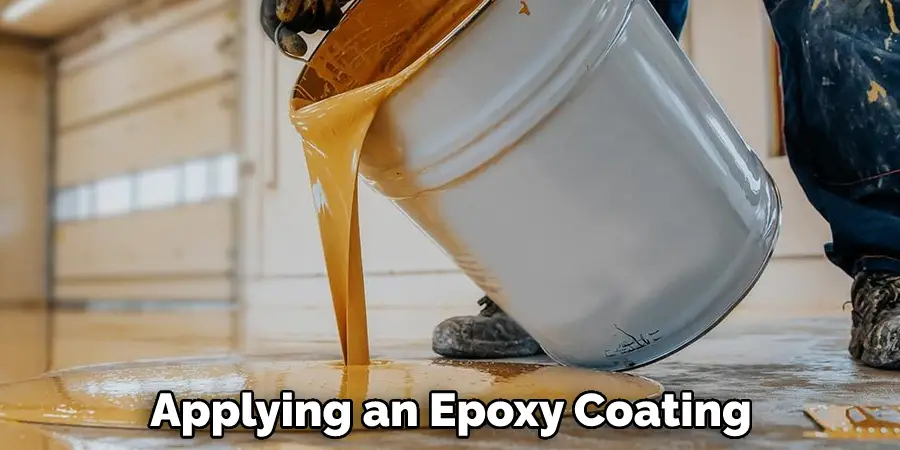
What to Expect When You Get Epoxy Flooring Installed?
Many people choose epoxy flooring for its durability and resistance to stains and spills. Epoxy is a type of resin that is mixed with hardeners to create a strong, glossy finish. It is often used in commercial kitchens and laboratories because it can withstand high traffic and heavy use.
Epoxy floors can last for many years when properly installed and cared for. If you are considering epoxy flooring for your home or business, here are a few things to keep in mind.
First, epoxy flooring must be installed by a professional. The installation process is complex and requires special training and equipment. If you attempt to install epoxy flooring yourself, the finished product will likely be inferior to a professionally installed floor.
Second, epoxy flooring is available in a variety of colors and patterns. You can choose from solid colors, marbled effects, or even metallic finishes. Third, epoxy floors are easy to clean and maintain. Spills can be wiped up easily, and dirt and dust will not adhere to the surface.
Finally, epoxy floors are an investment that will pay for itself over time. Although the initial cost of installation may be higher than other types of flooring, the durability of epoxy floors means that they will last much longer than other options.
When you factor in the cost of replacement and repairs, epoxy floors are often more economical in the long run.
Conclusion
There are both pros and cons to using epoxy on your basement floor. When deciding, keeping your budget, aesthetics, and maintenance needs in mind is important. Epoxy basement floors can be a beautiful and durable addition to your home, but they’re not right for everyone. Be sure to do your research before making a final decision. After reading this blog post, you know the answer: Should I epoxy my basement floor.

